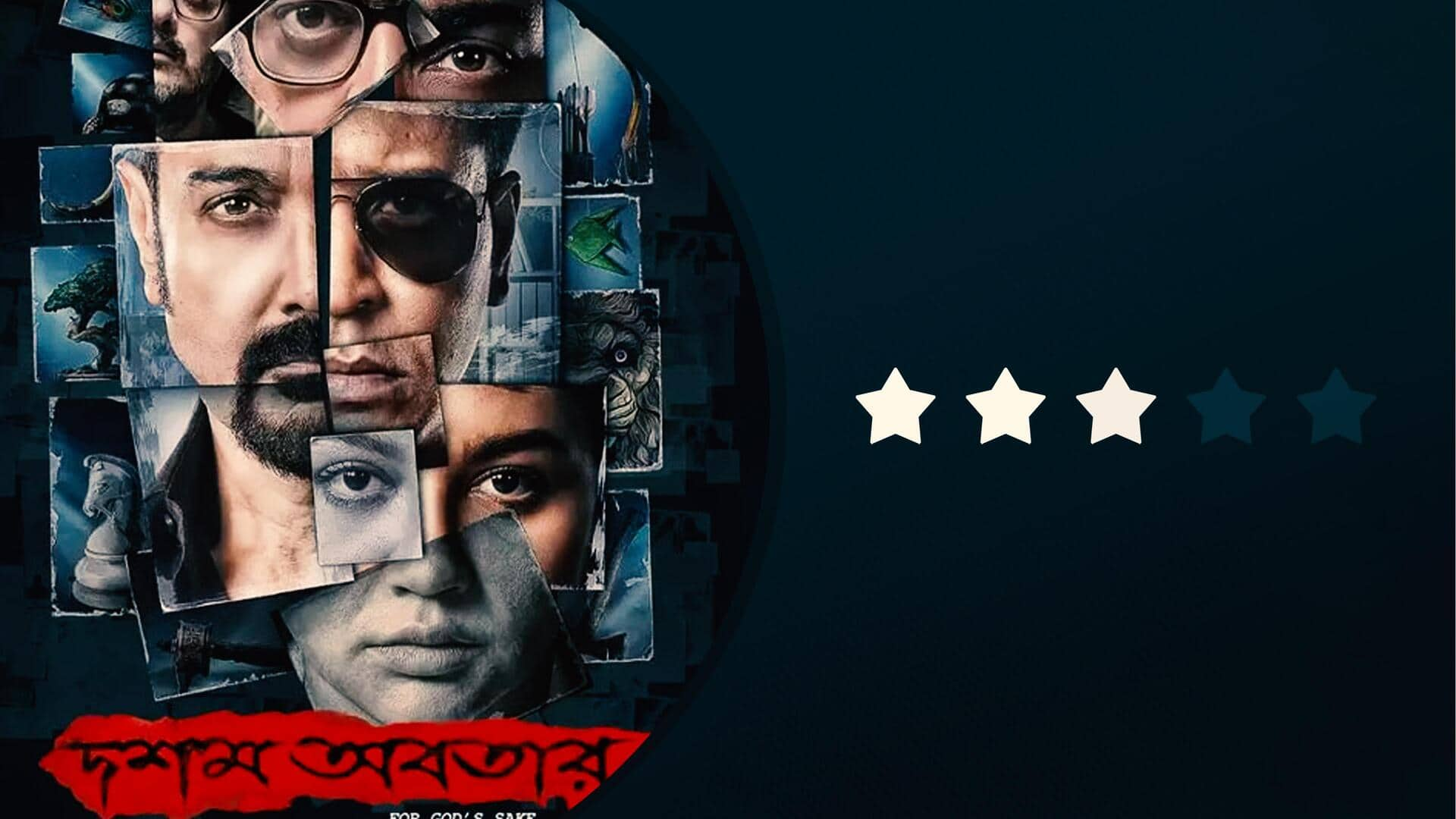
'Dawshom Awbotaar' review: Nostalgia and punchlines save the undercooked thriller
What's the story
Bengali cinema's power-packed duo Srijit Mukherji and Prosenjit Chatterjee returned on celluloid with the crime thriller Dawshom Awbotaar on Thursday. The much-awaited thriller serves as the prequel to Baishe Srabon and Vinci Da and marks the inception of Tollywood's first cop universe. The movie thrives on nostalgia and great buildup but falls prey to a weak climax and resolution. Here's our review.
Story
Enter the world of 'Dawshom Awbotaar'
The Mukherji directorial is set in Kolkata 2003, when a serial killer Bishshorup Bardhan (Jisshu Sengupta) claims himself to be Lord Vishnu's 10th avatar—Kalki. The police department resorts to Probir Roy Chowdhury (Chatterjee) and Inspector Bijoy Poddar (Anirban Bhattacharya) to solve the case. The howdunit and whydunit thriller also stars the enigmatic Jaya Ahsan in a pivotal role.
Screenplay
Shoddy writing hampers parts of screenplay
Mukherji dedicates the film to Agatha Christie and pitches the sub-plots perfectly. From Bardhan dropping tulsi beads (hinting at Vishnu's followers) in murder scenes to penning some generation-defining dialogues, he does it all with conviction. The screenplay is tight in the first half but falters in the second and ends up hampering the climax and conclusion. However, Mukherji attempts massy cinematic treatment with DA.
Cinematic treatment
Mukherji's foray into 'massy' treatment
Indian cinema has been engulfed by larger-than-life and massy characters, and Mukherji has also hopped on the same bandwagon. If Baishe Srabon's Probir was subtle yet raw, DA's Probir (who is in his prime) is all about sass and punchlines. From Probir and Poddar's entry scenes to Indradeep Dasgupta's pulsating peppy background score, Mukherji's tryst with massy handling turns out to be semi-successful.
Highlight
Brewing bromance: Roy Chowdhury-Poddar's banter is a must-watch
The thriller marks the start of a brewing bromance between Roy Chowdhury and Poddar. Two eccentric witty characters divided by age and experience but connected with a common thread—family. Both the protagonists hide their traumatic past in their masks of typical "aantel" (pseudo-intellectual) humor. Interestingly, even though Poddar is submissive around Roy Chowdhury, their usual banter is the USP of this film.
Character
Mukherji imagines Sengupta in a new antagonist 'avatar'
Every time Mukherji and Sengupta collaborated on celluloid, cinema has received gems like Rahul (Nirbaak), Kabir (Rajkahini), Kashinath Kundu (Zulfiqar), and Mahendra Kumar Chowdhury (Ek Je Chhilo Raja). The director has repeatedly presented him with darker, complex characters, hence making it a delight for viewers. The duo hits the bullseye with DA and Sengupta exudes the cold yet daunting persona with ease.
Negative
Dodgy climax steals the thrill away
In the recent past, Mukherji's works have fallen prey to shoddy climaxes and DA is no exception. After a smooth build-up in the first half, the second half gets stretched with Ahsan-Bhattacharya hamming in the undercooked finale scene. Unlike Baishe Srabon's Roy Chowdhury's Sesher Kobita recital, Mukherji fails to create an impact with Ahsan reciting Rainer Maria Rilke's translated work.
Information
Ahsan's character deserved better writing
Baishe Srabon or Dwitiyo Purush had iconic crescendo-resolution scenes as viewers were invested in the characters' background stories. Mukherji fails to replicate the same in his direction as Ahsan's character of psychiatrist Moitreyee Ghatak is not fleshed out well, hence leading to a shallow denouement.
Information
The Holy Trinity: Mukherji-Chatterjee-Roy strike again in music department
Every time Mukherji and Chatterjee have collaborated with Anupam Roy, they have delivered chartbuster albums. DA's album is the confluence of rock, romantic ballads, and Hindustani classical music. Pandit Ajoy Chakrabarty's Sanskrit stotra adds the much-needed depth to the album.
Cinematography
Vintage visuals: Haldar's allegory meets Mukherji's vision
Mukherji is known for his distinct visuals and his long-time collaborator cinematographer Soumik Haldar hits it out of the park. The visual allegory of pigeons flying when the cops are on the prowl to catch the killer and the extended long take during the bike chase sequence are absolute favorites. Brownie points to Mukherji-Haldar for the impeccable block frame of Ramayana during the climax.
Verdict
If you are a Probir stan, watch 'Dawshom Awbotaar'
Bengali cinema has a festive bonanza with four big releases. As per the pulse, Dawshom Awbotaar has an upper hand at the box office. If you are invested in Mukherji's cop universe, the film offers a nostalgia trip infused with slow-motion cinematic shots. This weekend, bow down to the quintessential cop aka Probir Sir! Verdict: 3/5 stars.